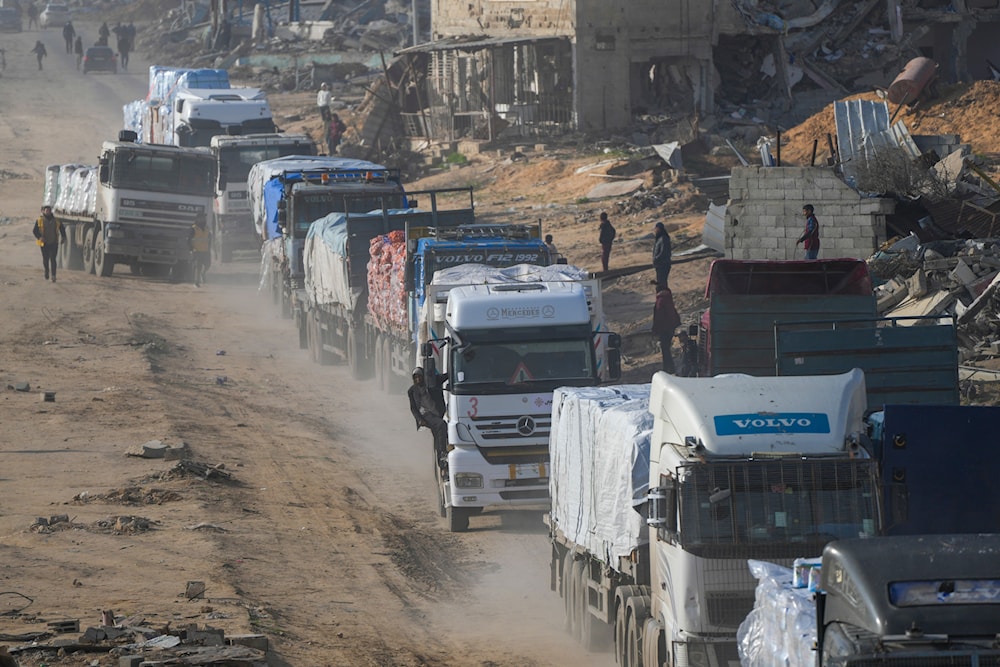UN warns 'Israel' still restricting crucial aid to Gaza
Global humanitarian groups continue to sound the alarm over the insufficient level of aid reaching Gaza.
-

Trucks carrying humanitarian aid enter the Gaza Strip from Egypt in the southern Gaza town of Rafah, on Wednesday, February 12, 2025. (AP)
Despite the entry of 801 aid trucks into the besieged Gaza Strip on Wednesday, humanitarian organizations warn that "Israel" continues to severely limit the flow of essential supplies, in violation of the ceasefire agreement with the Palestinian resistance movement Hamas.
According to the UN’s Office for the Coordination of Humanitarian Affairs (OCHA), the aid deliveries were made "through interactions with the Israeli authorities and the guarantors for the ceasefire deal." However, the agency cautioned that restrictions remain stringent, particularly on critical supplies like fuel and medical equipment.
The UN and its partners are striving to use every available opportunity within the fragile truce "to scale up the provision of water, food, shelter, health, sanitation, hygiene, clothing, education, and other assistance to the people of Gaza."
Meanwhile, Israeli military operations in the occupied West Bank continue to inflict civilian casualties, displacement, and infrastructure damage, OCHA reported.
The UN Relief and Works Agency (UNRWA) stated that during the first two weeks of the ceasefire, it managed to provide food assistance to 1.2 million people in Gaza. The agency has also established 37 additional shelters in the northern part of the enclave, supplying displaced families with vital aid, including tents, blankets, and winter clothing. "As of last week, UNRWA was hosting about 120,000 people in 120 shelters, including more than three dozen that opened since the ceasefire."
Global humanitarian groups continue to sound the alarm over the insufficient level of aid reaching Gaza. Last week, the Norwegian Refugee Council (NRC) stressed that current deliveries "are insufficient to respond to the needs of the residents."
Meanwhile, UN Under-Secretary-General for Humanitarian Affairs Tom Fletcher described the devastation in Gaza as beyond comprehension.
"The scale of destruction and suffering is beyond my worst fears," he said on February 6.
The big picture
The current fragile ceasefire agreement has been at risk of being jeopardized in recent days, and Israeli Prime Minister Benjamin Netanyahu threatened on Tuesday that the bombardment of Gaza would resume if captives were not released by Saturday.
His statement matched that of US President Donald Trump, who warned a day earlier that "hell" would break out if Hamas did not release "all" Israeli captives by Saturday.
This comes after the spokesperson for the Martyr Izz al-Din al-Qassam Brigades, Abu Obeida, announced that the captive exchange set for February 15 has been postponed until further notice, due to the ongoing Israeli violations of the ceasefire agreement.
The violations include Palestinians being shot at, tanks trespassing the permitted distance, and preventing the entry of heavy equipment, medical supplies, and caravans.
Work is currently underway to remove obstacles so that the ceasefire agreement would continue to be implemented. Al-Qahera al-Ekhbariya announced earlier on Thursday that mediators saw success in bridging the gaps between the two sides.
Read next: 'Israel' to proceed with ceasefire if 3 captives released Sat: Axios

 3 Min Read
3 Min Read










